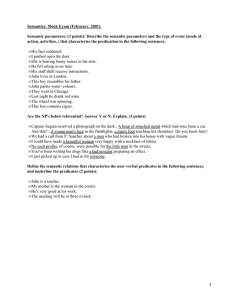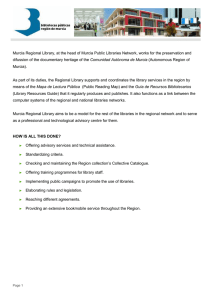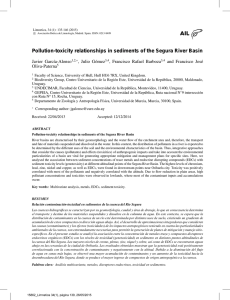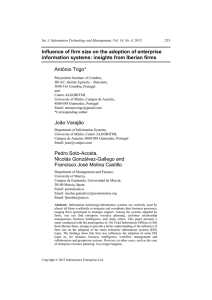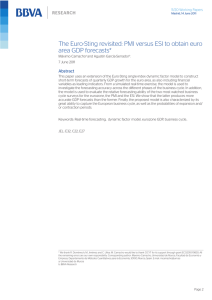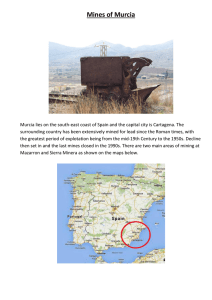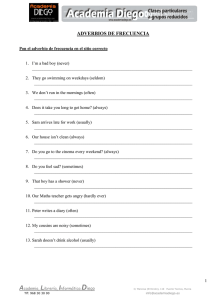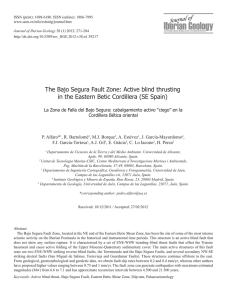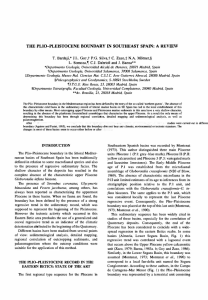Source of the Mundo river GOBIERNO DE ESPAÑA
Anuncio
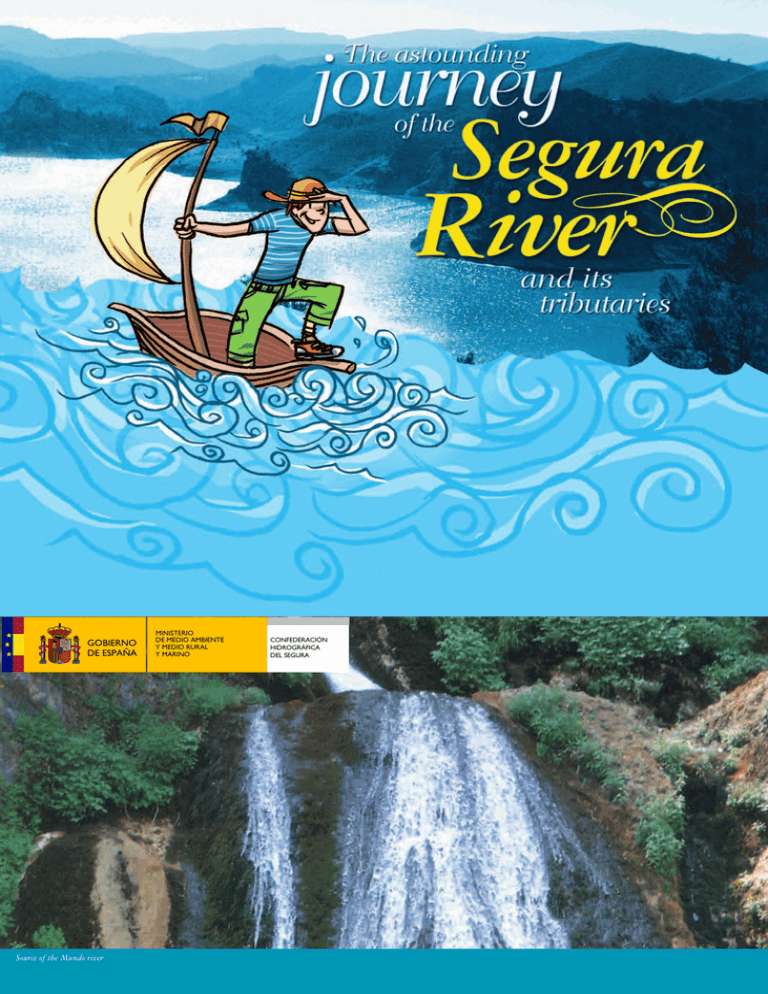
GOBIERNO DE ESPAÑA Source of the Mundo river MINISTERIO DE MEDIO AMBIENTE Y MEDIO RURAL Y MARINO CONFEDERACIÓN HIDROGRÁFICA DEL SEGURA CHS What is the Segura River Basin Authority and what it does • It is the organisation responsible for the planning, management and distribution of the water resources in the Segura basin. • Like other River Authorities, it depends on the Ministry of the Environment and the Rural and Marine Environments. It dates back to the year 1903 and the creation of the División Hidráulica del Segura, which assumed all the responsibilities for public water and the corresponding civil engineering work. • It was the second river authority to come into service after that of the Ebro river. It was created on 23 August 1926 under the name of Confederación Sindical Hidrográfica del Segura. • The current name Confederación Hidrográfica del Segura (CHS) was assumed in 1934 by virtue of Decree dated 21 May. • As part of its work, the CHS has to manage the available water resources and demands for different purposes (farming, industry, human consumption, tourist developments, etc.) in accordance with the principles of sustainable environmental management and the participation of all citizens. • These principles are provided in the Water Framework Directive (WFD), which was adopted by the European Parliament on 22 December 2000. The WFD provides the legal framework and general principles for the protection and sustainable use of water in every country of the European Union and its aim is to achieve the appropriate status of every water body by 2015. Anchuricas Reservoir The source of the river lies in Sierra de Segura, in the province of Jaén, at a height of 1,413 m above sea level, approximately 5 km from the town of Pontones. The Segura flows through land that is generally mountainous and often above the height of 1,000 m. These peaks alternate with valleys, depressions and plains. Along the course of the river, there are three giant mountains of more than 2,000 m: Sierra de las Cabras (2,081 m), in the province of Albacete; Cerro Poyo (2,045 m) in Sierra de María, to the north of the province of Almería; and Revolcadores (2,014 m), located in Sierra Seca in the municipal district of Moratalla (Region of Murcia). On the border between the provinces of Murcia and Albacete, it collects water from the Mundo river and, at Calasparra, it joins up with its tributaries the Moratalla river and the Argos river. This area is also home to the natural location of the Almadenes Gorge, one of the Luchena river In Abarán, there are four waterwheels, including the wheel with the largest diameter in Europe, which is currently in operation and known in Spanish as the Noria Grande (the Large Waterwheel). When the river crosses Blanca, it comes to the Azud de Ojós. The word azud comes from Arabic and means dam. The Azud de Ojós was built in the Strait of Solvente in 1978 to reroute the water of the Tajo-Segura Transfer: on the left towards Alicante and Cartagena and on the right towards Lorca and Almería. It is surrounded by an area of great beauty and environmental interest, which also marks the location for the towns of Ulea and Archena. The river then crosses the towns of Ceutí, Lorquí, Alguazas and Molina de Segura, collecting water from the Mula river before coming up against another azud: La Contraparada. This dam dates from the 10th century. It is located in Javalí Nuevo (Murcia) and is the starting point La Cierva Reservoir Water House most beautiful areas in the river basin and divided into two sections. The first section of the gorge, with its riverbank forests and abundant animal and plant life, is well known to riverdescent enthusiasts, who prefer either canoes or Zodiacs, and welcomes all ages. It is also the location for the Cave of Los Monigotes or Abrigo del Pozo, with cave paintings that date back to the Eneolithic Age. The section ends at the Mulata dam after collecting water from the Quípar river. The second section of the gorge, of karst origin, has a length of approximately 4 km, along which the Segura flows between walls that stand above 100 m in height. This is also the location of the Cave of La Sima de la Serreta, which has paintings and remains from the Bronze Age and the Iber-Romans. After it crosses this area, the river comes to the town of Cieza. Here, the Moorish set up a large network of channels that carried the water to all the farmland in the Segura basin, filling the river’s course with bridges, mills and water wheels. for the major irrigation channels of Aljufía, or Mayor (in the north), and Alquibla, or Barreras (in the south), which take irrigation water to most of the farming region of Murcia. Later, the 16th century saw the construction of the Churra la Nueva irrigation channel, also to the north of the city of Murcia. Today, it is still possible to see even more waterwheels in Alcantarilla and La Ñora. The river then crosses the city of Murcia, collects water from the Guadalentín river, channelled by El Reguerón, and then flows through the farming towns of Beniel and Orihuela. In an area dominated by salt flats, it flows through Rojales before forming the Dunes of Guardamar at its mouth. This is an area of dunes that stretches along 11 km. Next to it, there is a forest of pine trees and date palms, originally planted to stop the advance of the sand. According to recent archaeological finds, the sand in this area covers the remains of one of the most important Phoenician towns of the Mediterranean and several Moorish mosques. El Cenajo dam Vega Alta Waterwheel SEGURA RIVER BASIN AUTHORITY Plaza Fontes, 1 Murcia - http://www.chsegura.es • Telephone: +34 968 358 890. Fax: 968 211 845 • Citizen suggestion box and service for the general public: segura@chs.mma.es • Public participation and Water Framework Directive: participacion.publica@chs.mma.es WATER FRAMEWORK DIRECTIVE http://europe.eu.int/comm/environment/water WATER HOUSE http://www.casaagua.com CONTRAPLANO Photographs: Archive of the Segura River Basin Authority, Mariano Pelegrín Garrido and José Antonio Vera Gomis. Almadenes Gorge on the Segura river GOBIERNO DE ESPAÑA Almadenes Gorge on the Mundo river MINISTERIO DE MEDIO AMBIENTE Y MEDIO RURAL Y MARINO CONFEDERACIÓN HIDROGRÁFICA DEL SEGURA
